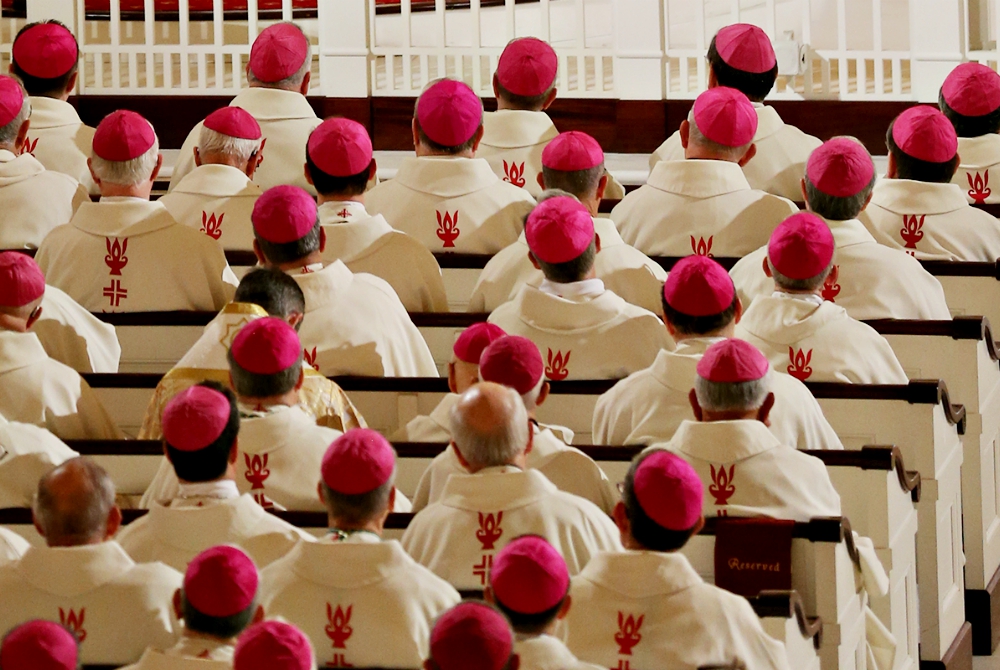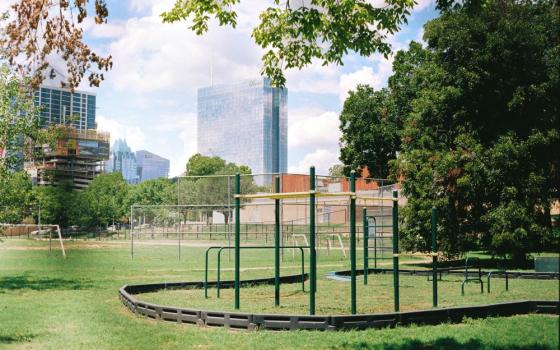
U.S. bishops listen to a homily during Mass at the Basilica of the National Shrine of the Assumption of the Blessed Virgin Mary in Baltimore on the eve of the November 2017 general assembly of the U.S. Conference of Catholic Bishops. (CNS/Bob Roller)
After a horrible summer of depressing news about how the church hierarchy has mishandled the sexual abuse crisis and misled the faithful willfully and through neglect, expectations were high for the action plan the leadership of the U.S. Conference of Catholic Bishops promised to deliver this fall. The four points outlined are, for the most part, good beginnings.
Given the intensity of feelings on this subject, probably no plan could satisfy Catholics in pews, but even with that caveat, we had hoped the plan would be stronger and more specific than what was delivered.
1. A confidential, third-party reporting system will be created to receive complaints of sexual misconduct and abuse by bishops toward minors or adults and "will direct those complaints to the appropriate ecclesiastical authority and, as required by applicable law, to civil authorities."
This appears to be a rather straightforward proposal, and it is especially important to include the requirement of reporting to civil authorities. Unclear, however, is "the appropriate ecclesiastical authority." Who is that authority, and where is that office housed? The tribunal Pope Francis authorized in 2015 to hear such cases would fill this need, but it was never implemented.
2. The bishops' committee on governance is to draft "policies addressing restrictions on bishops who were removed or resigned because of allegations of sexual abuse of minors or sexual harassment of or misconduct with minors or adults."
This is an obviously good idea, and we recommend that the restrictions imposed on any cleric with substantiated claims of abusing a minor be extended to bishops, namely: laicization and no public ministry.
What this proposal does not address are bishops who resign for covering up or enabling abuse. Without public restrictions for "negligence in the exercise of his office" (see point three below), we find that Cardinal Bernard Law can resign from Boston and retire to high offices in the Vatican. Cardinal Roger Mahony can defy the wishes of the sitting ordinary of Los Angeles and carry on in public ministry. Archbishop John Nienstedt can resign from St. Paul-Minneapolis and find safe haven in a Catholic think tank and lead pilgrimages to Poland. Bishop Robert Finn can resign from Kansas City-St. Joseph, Missouri, and give retreats for altar boys in Lincoln, Nebraska.
It is essential that these restrictions are made public. The day after the administrative committee met on the action plan — the day the conference leadership met with Francis — the Vatican announced the resignation of Bishop Michael Bransfield of Wheeling-Charleston, West Virginia, who had reached 75, the mandatory retirement age. A separate announcement came from Baltimore Archbishop William Lori that he was investigating allegations that Bransfield had sexually harassed adults. Was the resignation because of age or the allegations? This lack of transparency has characterized the abuse crisis for decades.
3. A Code of Conduct for bishops will be developed "regarding the sexual abuse of a minor; sexual harassment of or sexual misconduct with an adult; or negligence in the exercise of his office related to such cases."
It would seem to be relatively easy to extend the code of conduct and canon laws established by the Dallas Charter and Essential Norms to include bishops, so perhaps this can be accomplished quickly. Adding "negligence in the exercise of his office" to the list of offenses is welcome and long overdue. However, what body will oversee this code, and who will enforce it? Will its proceedings be shared with the wider church? How? Transparency and public reporting must be the watchwords for each of these proposals and for the development of these plans.
Advertisement
4. The committee said it supported "a full investigation into the situation surrounding Archbishop [Theodore] McCarrick ... as well any responses made to those allegations."
This sounds much weaker than the call Galveston-Houston Cardinal Daniel DiNardo, president of the bishops' conference, made Aug. 16 and reiterated Aug. 27 for an apostolic visitation in concert with lay experts, chosen by the National Review Board "and empowered to act." What happened to the apostolic visitation? Why has this been watered down? If this "full investigation" does not carry the full weight and authority of the Vatican, we fear it will become little more than a public relations showcase.
The bishops' administrative committee has proposed a few small steps, barely a beginning on the long, arduous journey out of this quagmire of a crisis. The protection policies and procedures that the U.S. Catholic Church has implemented over the last 15 years in most dioceses have made the church a safer place for children and vulnerable adults. But what has been accomplished so far addresses only the crimes and sins of individual actors.
This plan doesn't approach the deep examination of conscience by those who have held power in the church these last 40 years. What was outlined won't lead us to the full truth-telling that is needed so healing can happen.
We repeat our call: The U.S. church needs a process similar to Australia's Royal Commission into Institutional Responses to Child Sexual Abuse or the examination Chile went through under the specially appointed papal delegate Archbishop Charles Scicluna of Malta.
The U.S. church should invite a Vatican-appointed apostolic visitation team, assisted by competent lay experts, to review all documents at all levels of the church, to take testimony in parishes and chanceries, and to visit every seminary and formation house in the country. Participation must be mandatory for all. Anyone bound by a pre-existing nondisclosure agreement should be freed to speak to the visitation team.
The work of the visitation has to be made public at the end of its investigation. We would expect — like in Chile — for resignations to follow, but, more than that, we would expect to see a church in public penance.
The revelations we have experienced this summer have brought us face to face with the clerical and patriarchal structures of the Catholic Church that made this outrage continue for so long. That is what must be addressed.







